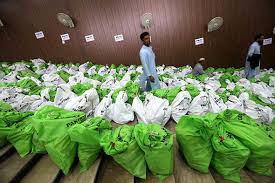Pakistan Goes To Polls Under Tight Military Arrangement
Lahore, Pakistan: On Wednesday, Pakistanis will go the elections after a campaign involving allegations against the military of tempering. But according to commentators, this would be nonetheless the second such civilian-to-civilian handover of power in the country’s history.

The voting process will open more than 85,000 polling stations at about 8 am in the morning and close at around 6 pm.
Results will be broadcast after several hours later, the election commission says.

During the election preparation, on Tuesday, ballot boxes, papers, and other essential election paraphernalia were transported to the polling stations.
The military of Pakistan has deployed more than 372,000 personnel to provide security inside and outside of every polling station.
“We are trying our best to deliver free, fair and unbiased elections in Pakistan,” said Sardar Muhammad Raza, the chief election commissioner, in a video message on Tuesday.
“On July 25, I ask that you leave your homes and use your vote correctly to fulfill your national responsibility.”
The process of casting votes will start for 272 members of the lower house of parliament, along with polling for country’s four provincial assemblies.
The season of the campaign ended up with a slew of allegations leveled between the country’s top three parties, Pakistan Muslim League-Nawaz (PML-N), Pakistan Tehreek-e-Insaf (PTI) and Pakistan People’s Party (PPP).
Candidates of the PML-N and Bilawal Bhutto Zardari’s PPP have put up allegations over the country’s powerful military of intimidating supporters and forcing candidates to switch allegiances.
Not less than 20 PML-N members left the party those weeks leading to the vote of which some joined the PTI or choose to run as independents.
And on July 13, PML-N chief Nawaz Sharif was sentenced after being convicted by an anti-corruption court after a 10-month trial.
The brother of convicted former Prime Minister, Shahbaz is contesting the election by becoming the party’s presumptive nominee for prime minister.
The Pakistan Tehreek e Insaaf headed by cricketer-turned-politician Imran Khan has rejected all allegations that the military has been preferring him on its behalf and thus interfering in the election process and claimed that the charges were part of a foreign conspiracy.
The military too denies any role directly or indirectly in politics.
But as per the comments of The Human Rights Commission of Pakistan (HRCP), an independent watchdog, elections this time are “the dirtiest in the country’s history”.
Earlier this month, the agency in a statement said that it was very much concerned over “blatant, aggressive and unabashed attempts” to manipulate the outcome of the elections.
“While it is critical that the polls are held as scheduled, there are now ample grounds to doubt their legitimacy,” the statement said.
The accuracy of polling data is scant and the country’s most populous region of Punjab may decide who comes into power. The province is also the PML-N’s heartland.
There is also a great concern over the so-called “mainstreaming” of armed groups in the country’s politics as the far-right Ahle Sunnat Wal Jammat and Milli Muslim League fielding hundreds of candidates in the polls. Both the parties are deemed for armed groups by the United Nations.
The country will go through a tense security situation after a bloody campaign season saw more than 179 people killed in a series of suicide attacks targeting election rallies.
Over than 154 people were killed due to a single attack in the southwestern town of Mastung, the second deadliest attack ever on Pakistani soil.
You May Also Read: Blood Test Can Predict Type Of Treatment For Advanced Prostate Cancer